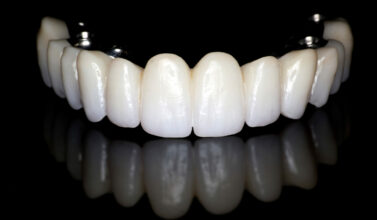A Guide to Understanding the Procedure and Benefits
Zygomatic dental implants, also known as zygoma implants, are a type of dental implant that offers a viable solution for patients with missing teeth and severe bone loss in their upper jaw. Unlike conventional dental implants, which are placed into the jawbone, zygomatic implants are anchored into the cheekbones. In this blog post, we will discuss what zygomatic implants are, how the procedure works, and the benefits they offer to patients.
What are Zygomatic Dental Implants?
Zygomatic implants are designed to provide support for a full arch of teeth in cases where there is insufficient bone in the upper jaw to support traditional implant placement. The procedure involves anchoring the implant into the zygomatic bone (cheekbone), which provides a more secure foundation for the All on 4 dental implant.
Zygomatic dental implants are typically longer than traditional implants, ranging from 35mm to 55mm in length, and are placed at a 45-degree angle in the jaw bone to maximise support and stability and remove the need for bone grafts.
How Does the Procedure Work?
The procedure for the zygoma implant placement is typically performed under general anaesthesia and involves a team of dental professionals, often including a prosthodontist and an oral and maxillofacial surgeon. The process begins with a comprehensive evaluation of the patient’s dental and medical history, as well as a CT scan of the jawbone and maxillary sinus.
Once the patient has been cleared for the procedure, the dental surgeon will create a small incision in the gum tissue and use specialised instruments to prepare the zygomatic bone for the implant. The implant is then carefully placed into the bone and secured into place.
After the implant placement, a temporary denture is attached to the implant to allow for healing and osseointegration (the process by which the implant fuses to the bone). Once the implant has fully integrated, the temporary denture is removed, and a permanent set of teeth is attached to the implants.
Benefits of Zygomatic Implants
There are several benefits of zygomatic implants, including:
- Increased stability: Zygomatic implant placement provides a more stable foundation for dental restorations, particularly in cases where traditional implants are not possible due to bone loss. Zygomatic implants also provide a strong foundation for All on 4 implants.
- Improved aesthetics: Zygomatic implants offer a natural-looking, aesthetically pleasing solution for patients with missing teeth.
- Reduced treatment time: Zygomatic implants allow for immediate loading, meaning patients can receive a full set of teeth in a single procedure, reducing treatment time and the number of visits to the dentist.
- Improved quality of life: Zygomatic implants allow patients to eat, speak, and smile with confidence, improving their overall quality of life.
What is the Difference between Zygoma and Conventional Dental Implants?
Zygoma implants attach to the cheek bone (zygoma bone) rather than the jawbone (alveolar bone). They are very stable, so they provide the perfect support for immediate replacement teeth and full-arch dental bridges.

3D render of zygomatic implants
What Type of Patients do Zygomatic Implants Suit?
Often prolonged periods in a denture or tooth loss are linked to jawbone deterioration. Often with tooth loss, the bone reshapes and can lead to the loss of bone foundations that are necessary for conventional dental implanting.
In most cases, the sinus spaces above the upper jaw also expand, thus weakening their underlying bones further. If the maxillary bone is inadequate to fit traditional dental implants, zygomatic implants can allow you to receive a full implant replacement without any bone grafting.
No Need for Bone Grafting Procedures
Zygomatic implants are designed to provide a viable solution for patients with missing teeth and severe bone loss in the upper jawbone, and as such, they do not require bone grafting. Traditional dental implants require a certain amount of healthy bone tissue in the jaw to support the implant, but in cases of severe bone loss, this may not be possible without bone grafting.
However, zygomatic implants are anchored into the zygomatic bone, which is denser and stronger than the jaw bone, allowing for greater stability and support. This means that even patients with significant bone loss can often receive zygomatic implants without the need for bone grafting.
Additionally, the placement of zygomatic implants at a 45-degree angle allows them to bypass areas of the upper jaw bone that may be compromised by bone loss, further reducing the need for bone grafting.
Overall, zygomatic implants provide a minimally invasive alternative to traditional implants, allowing patients with severe bone loss to receive a natural-looking, functional set of teeth without the need for bone grafting.
How Successful Are Zygomatic Implant Treatments?
Zygomatic implant procedures are very effective, especially considering the advancements in dentistry implant technology in the recent twenty years. In general, dental implants can only be successful when they meet certain conditions that can affect general health and the ability to maintain them as regularly as needed.
The implant requires brushing and flossing twice a day to ensure the implant’s hygiene as well as its proper cleaning. It’s also advised to attend regular dental hygiene visits to remove any spots that would otherwise need cleaning.
Immediate Upper Jaw Loading
Immediate loading is a technique used in zygomatic implants where a temporary denture or bridge is attached to the implant immediately after placement, allowing patients to receive a full set of teeth in a single procedure.
This technique offers several benefits, including reduced treatment time and the ability to restore function and aesthetics immediately. Patients who receive immediate loading can eat, speak, and smile with confidence from day one without the need for a long healing period.
Additionally, immediate loading reduces the number of visits to the dentist, as patients do not need to return for multiple appointments to have their denture or bridge attached.
Overall, immediate loading is a convenient and effective technique that can provide patients with a natural-looking, functional set of teeth in a shorter period of time.
How Long do Zygomatic Implants last?
These dental implants are extremely durable and are designed to be a long-lasting solution for patients. While the longevity of zygomatic implants can vary based on factors such as the patient’s oral hygiene habits, overall health, and lifestyle factors, studies have shown that zygomatic implants have a high success rate and can last for many years.
One study published in the Journal of Oral and Maxillofacial Surgery found that the survival rate of zygomatic implants after 5 years was 95.5%, and after 10 years, it was 91.6%. Another study published in the International Journal of Oral and Maxillofacial Surgery found a 10-year survival rate of 91.8%.
With proper care and maintenance, including regular dental check-ups, good oral hygiene, and avoiding habits such as smoking and excessive alcohol consumption, zygomatic implants can last for many years, providing patients with a natural-looking, functional set of teeth.
However, as with any dental procedure, it is important to discuss the expected lifespan of zygomatic implants with an experienced dental professional to determine if they are the right solution for your individual needs.
What are the Disadvantages of Zygomatic Implants?
While zygomatic implants can be an effective solution for patients with severe bone loss in the upper jaw bone, there are some potential disadvantages to consider. These include:
- Complexity: Zygomatic implant surgery is a complex procedure that requires specialised training and experience. Not all dental professionals are qualified to perform zygomatic implant surgery, so finding an experienced and skilled provider can be a challenge.
- Cost: Zygomatic implants are typically more expensive than traditional dental implants. The procedure requires specialised equipment and materials, and the surgery itself is more complex, which can result in higher costs for patients.
- Recovery time: While immediate loading can provide patients with a faster recovery time than traditional dental implants, zygomatic implant surgery still requires a recovery period. Patients may experience some discomfort, swelling, and bruising after the procedure and will need to avoid certain foods and activities during the healing process.
- Potential complications: As with any surgical procedure, there is a risk of complications with zygomatic implants. These can include infection, implant failure, nerve damage, and sinus complications.
- Not suitable for all patients: Zygomatic dental implants are specifically designed for patients with severe loss in the upper jaw bone. Patients with healthy bone tissue may not be good candidates for zygomatic implants, and alternative solutions may be more appropriate.
It’s important to discuss the potential advantages and disadvantages of zygomatic implants with an experienced dental professional to determine if they are the right solution for your individual needs.

Zygomatic and Traditional Implants side-by-side
Are Zygomatic Dental Implants for Me?
Zygomatic implants offer a viable dental implant solution for patients with a severe loss in the upper jaw bone, providing increased stability, improved aesthetics, reduced treatment time, and an improved quality of life.
With proper care and maintenance, zygomatic dental implants can provide a long-lasting, natural-looking solution for missing teeth. If you are considering zygomatic implants, it is important to consult with an experienced dental professional to determine if this procedure is right for you.
Fewer Procedures, a Faster Journey
The procedure is safe and predictable when performed by an experienced surgeon. This procedure is an effective workaround for those with a poor bone mass, requiring bone grafting or a sinus lift. The Zygoma implants procedure is completed at Aria Dental’s Perth Dental Implant Centre, under IV Sedation, by our Specialist Prosthodontist Dr Michael Zaninovich.
Contact Us



